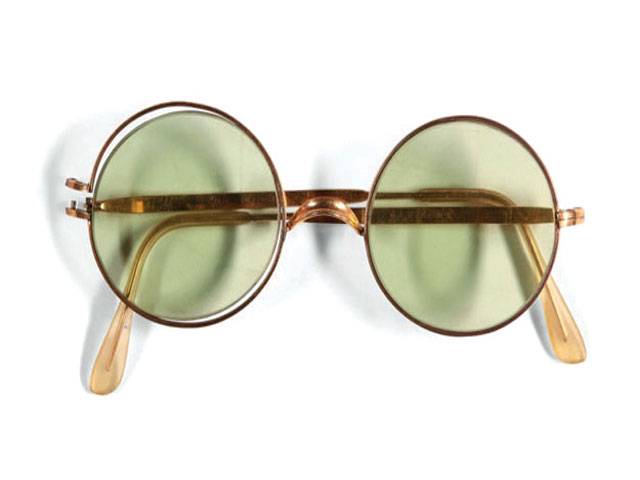John Lennon’s round glasses sell for nearly $200,000
LONDON - A pair of John Lennon’s sunglasses The Beatles legend once left behind in the back seat of a car sold Friday for nearly $200,000 at an auction in London.
Billed as one of the most famous specs in rock-and-roll, the round, green-tinted lenses and their golden frame belonged to Alan Herring, the chauffeur for the Liverpool quartet’s drummer Ringo Starr and band mate George Harrison.
“In the summer of 1968 I had picked John up with Ringo and George in Ringo’s Mercedes and driven the boys into the office,” Herring recalled in a statement released by the Sotheby’s auction house.
“When John got out of the car I noticed that he’d left these sunglasses on the back seat and one lens and one arm had become disconnected. I asked John if he’d like me to get them fixed for him. He told me not to worry they were just for the look!”
Herring said he never did get them fixed, and the pair sold for £137,500 ($183,500, 165,000 euros) in an online auction to an unnamed bidder.
The sale included other Fab Four collectibles, including a hippy necklace with cowbells warn by Harrison, which sold for £10,000. It was 50 years ago that The Beatles – (clockwise from L) John Lennon, Paul McCartney, George Harrison and Ringo Starr – released their 11th studio album, “Abbey Road.” Here’s a look at some photographs of the Fab Four over the years.
250,000 tons of plastic pellets known as nurdles pollute our oceans every year
US - Trillions of small plastic pellets known as nurdles have been escaping from petrochemical plants into waterways and oceans for decades. Only lately has serious action been taken to figure out what can be done, including a monumental settlement in Texas. In Cox Creek off the Gulf of Mexico, there are countless nurdles from the Taiwanese conglomerate Formosa Plastics factory nearby, “CBS This Morning: Saturday” co-host Jeff Glor reports.
“They managed to scoop up 79 billion in two years,” said Diane Wilson, a fourth-generation fisherwoman who used to captain a shrimp boat. Now, she’s an environmental activist, fighting one of the largest plastics manufacturers in the world. Formosa Plastics first opened a petrochemical factory in 1983. It now covers 2,500 acres of land near Port Lavaca, Texas. Trillions of polyethylene plastic pellets are made at the factory, the first step in making products that are used by people every day, from plastic bottles to bags, clothing and electronics.
But billions of plastic pellets are also lost and find their way into waterways and eventually oceans. Many wash back up onto the beach.
Jace Tunnell is the founder of Nurdle Patrol, a project that began tracking pellets after a massive spill near Corpus Christi, Texas, last year.
“We know for a fact that there’s a laundry list of over 200 species that are eating these pellets,” Tunnell said. “And then there’s also a concern about what these pellets, once they’re in the environment, they’re absorbing … PCBs, PAHs, DDTs, you know, all those acronyms we hear about, harmful chemicals. These absorb those chemicals.”
It’s estimated as much as 250,000 tons of nurdles enter the ocean each year.
“We can tell based on the colors, the period of time they’ve been out in the sun … this has been happening over many decades,” Tunnell said.
In North America, the problem is worst in the Gulf, all the way from Mexico’s Yucatan Peninsula to the Florida Keys.
Wilson began collecting pellets on the waterways she used to fish, meticulously documenting where and when they were found. And now, her work — 30 plastic tubs filled with evidence — has led to a record-breaking settlement. Formosa Plastics agreed to pay $50 million to help local fishermen and environmental cleanup projects in the area.
Wilson said she was in a “state of shock” when she heard the company was settling.







